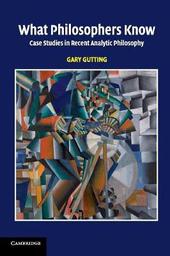
|
What Philosophers Know: Case Studies in Recent Analytic Philosophy
Paperback / softback
Main Details
| Title |
What Philosophers Know: Case Studies in Recent Analytic Philosophy
|
| Authors and Contributors |
By (author) Gary Gutting
|
| Physical Properties |
| Format:Paperback / softback | | Pages:264 | | Dimensions(mm): Height 228,Width 152 |
|
| Category/Genre | Philosophy |
|---|
| ISBN/Barcode |
9780521672221
|
| Classifications | Dewey:146.4 |
|---|
| Audience | | Tertiary Education (US: College) | |
|---|
| Illustrations |
Worked examples or Exercises
|
|
Publishing Details |
| Publisher |
Cambridge University Press
|
| Imprint |
Cambridge University Press
|
| Publication Date |
2 April 2009 |
| Publication Country |
United Kingdom
|
Description
Philosophy has never delivered on its promise to settle the great moral and religious questions of human existence, and even most philosophers conclude that it does not offer an established body of disciplinary knowledge. Gary Gutting challenges this view by examining detailed case studies of recent achievements by analytic philosophers such as Quine, Kripke, Gettier, Lewis, Chalmers, Plantinga, Kuhn, Rawls, and Rorty. He shows that these philosophers have indeed produced a substantial body of disciplinary knowledge, but he challenges many common views about what philosophers have achieved. Topics discussed include the role of argument in philosophy, naturalist and experimentalist challenges to the status of philosophical intuitions, the importance of pre-philosophical convictions, Rawls' method of reflective equilibrium, and Rorty's challenge to the idea of objective philosophical truth. The book offers a lucid survey of recent analytic work and presents a new understanding of philosophy as an important source of knowledge.
Author Biography
Gary Gutting holds the Notre Dame Chair in Philosophy at the University of Notre Dame. His most recent publications include The Cambridge Companion to Foucault, 2nd Edition (2005), Foucault: A Very Short Introduction (2005) and French Philosophy in the Twentieth Century (2001).
Reviews'This series of case studies of problems and advances in philosophical thinking argues effectively that philosophy can make progress and that philosophers do have distinctive substantial knowledge. The treatment is excellent: sophisticated and of interest to experts while also clearly-written and engaging for readers generally.' David Sosa, University of Texas at Austin
|